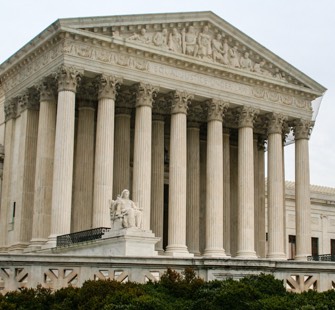 To the surprise of many, the United States Supreme Court has granted certiorari in Oil States vs. Greene’s Energy Group, et al. From a substantive standpoint, this dispute is between the parties to an inter partes review (IPR) proceeding conducted by the Patent Trial and Appeal Board (PTAB). By taking this case, the Supreme Court will address the constitutionality of having an Article I tribunal extinguish patent rights under the post grant proceedings created by the America Invents Act (AIA).
To the surprise of many, the United States Supreme Court has granted certiorari in Oil States vs. Greene’s Energy Group, et al. From a substantive standpoint, this dispute is between the parties to an inter partes review (IPR) proceeding conducted by the Patent Trial and Appeal Board (PTAB). By taking this case, the Supreme Court will address the constitutionality of having an Article I tribunal extinguish patent rights under the post grant proceedings created by the America Invents Act (AIA).
The Supreme Court granted certiorari only on the first question presented: “Whether inter partes review – an adversarial process used by the Patent and Trademark Office (PTO) to analyze the validity of existing patents – violates the Constitution by extinguishing private property rights through a non-Article III forum without a jury.”
The grant of certiorari in this case is particularly noteworthy given that the United States was asked by the Supreme Court for its views and opined in its brief that the petition should be denied.
The argument that inter partes review is unconstitutional can be traced back all the way to 1898 when the Supreme Court issued its decision in McCormick Harvesting Mach. Co. v. Aultman & Co., 169 U.S. 606 (1898). In that case, the Supreme Court held that once a patent is granted, it “is not subject to be revoked or canceled by the president, or any other officer of the Government” because “[i]t has become the property of the patentee, and as such is entitled to the same legal protection as other property.”
The phrasing of the question taken by the Supreme Court could be quite telling. Over the last several years, 8 of the 9 Supreme Court Justices have signed on to an opinion that has recognized that a patent confers either an exclusive or valuable property right. Thus, it would hardly seem a stretch to suggest that the Court, or at least the required four Justices necessary to take a case, have some reason to suspect that the extinguishing of a exclusive, valuable property through a non-Article III forum without a jury violates the Constitution.
While many will undoubtedly have varied opinions as to the importance of this decision by the Court to take this case, the truth is that any decision by the Supreme Court in Oil States simply cannot make things any worse for patent owners. The PTO already considers patents to be a public right, and post grant challenges, particularly inter partes review and covered business method review, are killing patent claims at exceptionally high rates.
This case will be argued during the October 2017 term, with a decision by the end of June 2018. In the coming months there will be much more analysis as the party briefs and amici are filed. Stay tuned.
For instant industry reaction please see: Industry Reaction to SCOTUS Granting Cert. in Oil States.
Tags: Inter Partes Review, IPR, Oil States v. Greene's Energy Group, patent, patents, SCOTUS, Supreme Court




You share in the PLI Practice Center community, so we just ask that you keep things civil. Leave out the personal attacks. Do not use profanity, ethnic or racial slurs, or take shots at anyone's sexual orientation or religion. If you can't be nice, we reserve the right to remove your material and ban users who violate our Terms of Service.